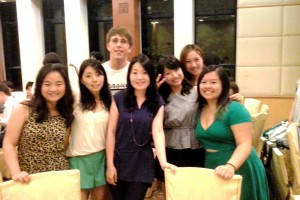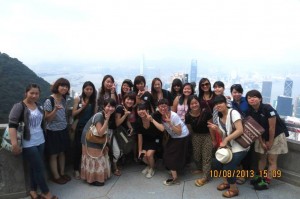If the thought of tight competition and application procedure hinder you from going on an exchange, I can tell you that it is not like that at all! I was fortunate enough to be able to go on this programme in Chinese University of Hong Kong (CUHK) after another summer school in South Korea. Let me start with a brief video introduction to Hong Kong….
Hong Kong is a Chinese Special Administrative Region (SAR), it has its own government and regulations separate from that of mainland China. Being a former British colony, most of the locals can speak English; which made me feel so relieved because Cantonese is not something I can learn by myself and my Mandarin was rusty. The whole region, which is merely two thirds of London, is occupied by seven million people and is awfully crowded. Luckily my destination is located away from all the hustle and bustle in the quieter area of New Territories, just half an hour away from the bordering mainland China.
CUHK was built in the 1960s when the land price was much lower relative to it is now, so the campus has the privilege of a large area and its own railway station. I was placed in the International House whose living rooms have the nice view of Tolo Harbour. The entire Hong Kong is green and mountainous, and so is the campus; but to be honest I was really bothered by the mosquitoes which I have an allergic reaction to.

The three week language programme that I took was pretty intensive; it is designed so that students can improve significantly in that short period of studying. I took the intermediate class since I had studied Chinese for some time before and I really wanted to make use of my time there to improve my skills.
When studying a language, choosing a level that suits you is a bit tricky. The golden rule is to select a level reasonably challenging so that you learn something from it, but you can still catch up with the class. For this particular programme, there were placement tests and transfer period to help students decide a level that suit them best.
To describe how intensive the course was, every two days I learned a new chapter, each consisting about forty new vocabulary, and we managed to cover seven chapters during the course. Imagine that! The money spent on that three week course was some money well spent.

Wang Laoshi starts each new chapter by covering all the new vocabulary and explaining how they are used in context. The next day, Han Laoshi conducts discussion sessions related to the topic in the chapters; hence the students learn to make use the new words in sentences. Listening practice was important too because native Mandarin speakers speak really fast and we were trained to get used to it.
The course may look tough as I read the paragraph again, well it was, not to mention the homework and dictation tests.. But it was enjoyable because while practising speaking Mandarin we could get to know each other (and the teacher) and tell some interesting stories too. I personally like reading the least because my brain takes a long time comprehending all the Chinese characters, but the reading materials prepared by the school were quite amusing.
In the monsoon season, Hong Kong experiences a great deal of typhoons and thunderstorms because of its position in the South Chinese Sea. There was one day when our classes (and a test, yay!) were cancelled because typhoon signal number eight was reinforced, meaning everyone should stay indoors. The sound of thunder and the bright lightning woke me up at three in the morning; I saw my bedroom window bashed by rain water like it was being washed.

The programme kept us busy even on Saturdays with field trips. We were brought around Hong Kong, Macau, Shenzhen and Lantau Island, the last being a substitute trip for students who did not have a Chinese visa to go to Shenzhen (bear in mind that a Hong Kong visa does not allow you to enter mainland China).
My favourite was the Lantau Island trip where I took a cable car to see the Big Buddha and try monk’s vegetarian meal in a monastery run restaurant. The serene atmosphere at the monastery combined with the cool and foggy weather on the day I went was a wonderful change from the usually hot and busy Hong Kong.
Sometimes Hong Kong drove me mad when it is dreadfully packed, but sometimes I felt like I was home. I miss CUHK already as I write this blog, I miss the friends, the nights out and strangely enough, the classes. I am so glad I went on this programme and I am sure wherever you go for exchange, you can make good memories too!

Sounds fun!
I also miss you and CUHK as I read this article you wrote. See you when I study abroad in the UK
I also miss you and Hong Kong as I read this article. See you when I study abroad in the UK! 🙂
Nice!!
I wish my uni does exchange student programme to Asia 🙁